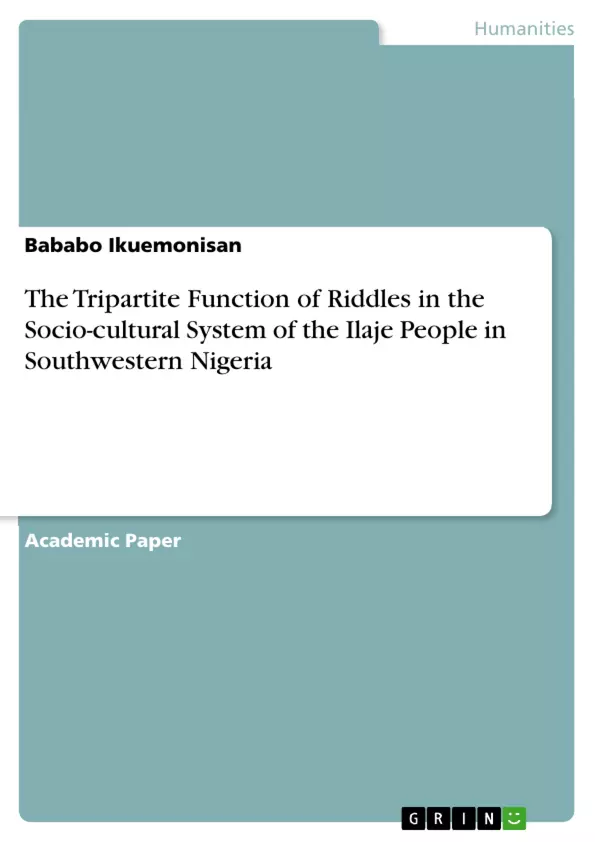Undoubtedly, the place of riddles as a form of oral literature cannot be overemphasized in the socio-cultural system of the Ilaje people. Riddles are repository of artistic expression, traditional wisdom, knowledge and values that had in time past sustained Ilaje autochthon heritage being that, they were passed down from one generation to another through the medium of mouth. Thus, help to develop children cognitive, preserve cultural heritage while serving the duo purpose of entertainment and education. The core of this paper therefore is to catalogue riddles, originally written in Ilaje dialect while it takes a cursory look at the tripartite function of Riddles in Ilaje socio-cultural system using the historical narrative methodology.
Table of Contents
- Introduction
- Definition of terms
- Ilaje Ancient Riddles
- Tripartite Function of Riddles in Ilaje Socio-cultural System
- Riddles as Tool for Education
- Riddles as Tool of Entertainment
- Riddles as Tool for Preservation of Cultural Heritage
- Conclusion
- References
Objectives and Key Themes
This paper aims to catalog Ilaje riddles, originally written in the Ilaje dialect, and examine their tripartite function within the Ilaje socio-cultural system using a historical narrative methodology. The study seeks to highlight the importance of preserving this unique form of oral tradition in a rapidly changing world.
- The role of riddles in Ilaje education
- The function of riddles as a form of entertainment within Ilaje culture
- The significance of riddles in preserving Ilaje cultural heritage
- The impact of modernization on Ilaje oral traditions
- The importance of preserving and transmitting Ilaje cultural knowledge
Chapter Summaries
Introduction: This chapter introduces the Ilaje people, a distinct Yoruba subgroup in Ondo State, Nigeria. It details their history, including their displacement from Ile-Ife and subsequent settlement along the coastline. The chapter highlights their unique adaptation to a challenging geographical environment and explores various interpretations of the name "Ilaje." It emphasizes the Ilaje people's reliance on oral traditions, particularly riddles, for preserving their cultural heritage in the absence of extensive written records due to their harsh living conditions.
Definition of terms: This section clarifies the concepts of "oral traditions" and "riddles," drawing on scholarly definitions to establish a clear understanding of these key terms and their relationship within the context of the study. It specifically references Jan Vansina's definition of oral traditions as verbal messages conveying past events.
Ilaje Ancient Riddles: This chapter is expected to present a collection of Ilaje riddles, providing examples of the riddles themselves. Further information on the content of this section is not available in the preview provided.
Tripartite Function of Riddles in Ilaje Socio-cultural System: This chapter analyzes the multifaceted roles of riddles within Ilaje society. It is likely to discuss how riddles serve as educational tools, transmitting knowledge and values across generations. Furthermore, it will probably explore their entertainment value and their crucial role in preserving and transmitting cultural heritage, ensuring the continuity of Ilaje traditions and customs.
Keywords
Ilaje, oral tradition, riddle, cultural heritage, education, entertainment, Yoruba, Nigeria, socio-cultural system, autochthonous heritage, oral literature.
Frequently Asked Questions: A Comprehensive Language Preview of Ilaje Riddles
What is the main topic of this text?
This text is a comprehensive preview of a research paper focusing on Ilaje riddles, their functions within the Ilaje socio-cultural system, and their importance in preserving Ilaje cultural heritage. It details the objectives, key themes, chapter summaries, and keywords of the complete work.
Who are the Ilaje people?
The Ilaje are a distinct Yoruba subgroup residing in Ondo State, Nigeria. They have a unique history, including displacement from Ile-Ife and adaptation to a challenging coastal environment. Their culture relies heavily on oral traditions, particularly riddles, due to a lack of extensive written records.
What is the purpose of this research paper?
The paper aims to catalog Ilaje riddles (originally in the Ilaje dialect), analyze their tripartite function within Ilaje society, and highlight the significance of preserving this oral tradition. It utilizes a historical narrative methodology.
What are the three main functions of Ilaje riddles discussed in the paper?
The paper explores the tripartite function of riddles as: (1) Educational tools, transmitting knowledge and values; (2) Forms of entertainment within Ilaje culture; and (3) Crucial elements in preserving and transmitting cultural heritage, ensuring the continuity of Ilaje traditions and customs.
What key themes are explored in the paper?
Key themes include the role of riddles in Ilaje education and entertainment, the significance of riddles in preserving Ilaje cultural heritage, the impact of modernization on Ilaje oral traditions, and the importance of preserving and transmitting Ilaje cultural knowledge.
What is included in the "Definition of terms" section?
This section clarifies the concepts of "oral traditions" and "riddles," using scholarly definitions to establish a clear understanding of these terms within the study's context. It specifically references Jan Vansina's definition of oral traditions.
What kind of information is provided in the chapter "Ilaje Ancient Riddles"?
This chapter presents a collection of Ilaje riddles, offering examples of the riddles themselves. However, further details are not available in this preview.
What are the keywords associated with this research?
Keywords include: Ilaje, oral tradition, riddle, cultural heritage, education, entertainment, Yoruba, Nigeria, socio-cultural system, autochthonous heritage, and oral literature.
What methodology is used in this research?
The research employs a historical narrative methodology to examine the role of Ilaje riddles within their socio-cultural system.
Where can I find the complete research paper?
The provided text is only a preview. The location of the complete research paper is not specified in this preview.
- Quote paper
- Bababo Ikuemonisan (Author), 2021, The Tripartite Function of Riddles in the Socio-cultural System of the Ilaje People in Southwestern Nigeria, Munich, GRIN Verlag, https://www.grin.com/document/1118685



